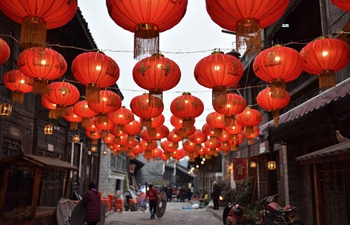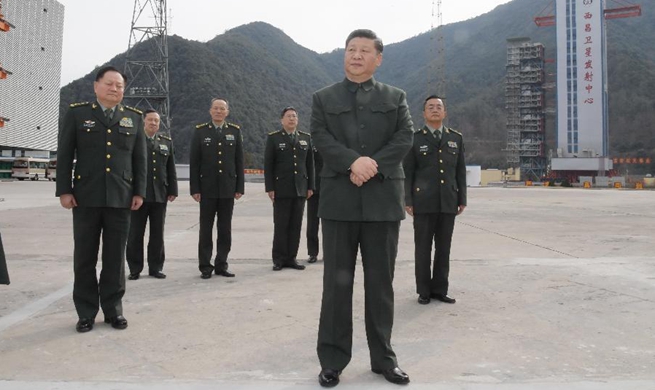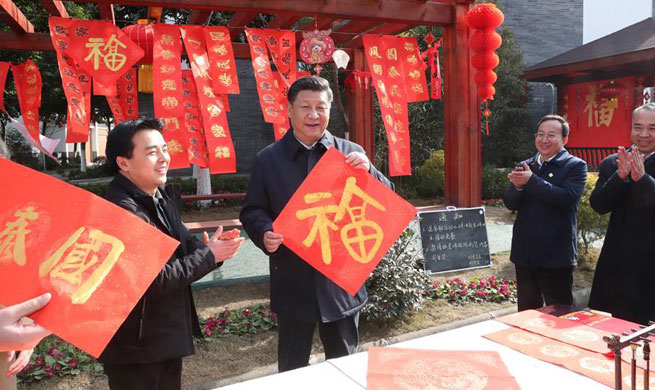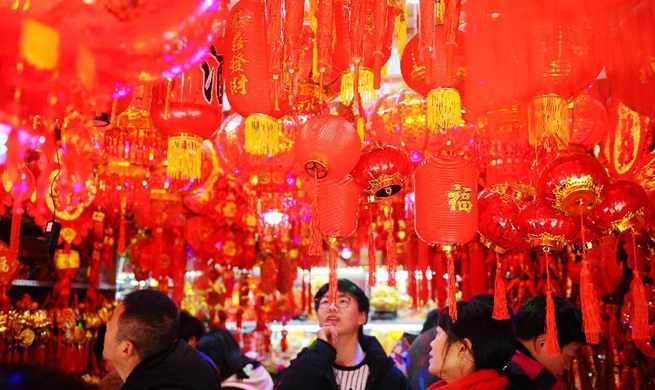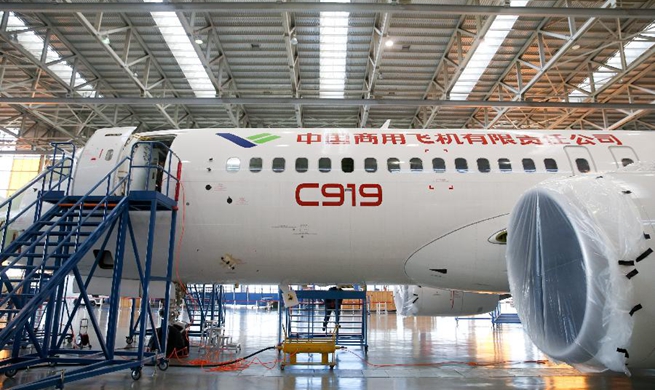by Xinhua writers Yuan Quan and Zhou Runjian
BEIJING, Feb. 13 (Xinhua) -- China's capital will be welcoming the Lunar Year of the Dog this month with uncharacteristic quiet.
Beijing authorities have banned fireworks in the city proper during the week-long Spring Festival holiday from Feb. 15. There are also fewer fireworks retailers and display areas in outlying suburbs.
Neighboring Tianjin and Hebei and some southern provinces have also followed "the strictest firework ban in the past 12 years" in light of heavy air pollution and injuries.
"I'm disappointed by the ban," says Liu Bin, 41, a Beijing kite maker. "The Lunar New Year is less joyful than in my childhood, when all the boys looked forward to the fireworks."
It is not the first such ban. In 1994, also the Year of the Dog, Beijing, Shanghai and Guangzhou prohibited fireworks in downtown areas for safety reasons.
The ban lasted 12 years, and was lifted in 2006 with protests that it was cultural tradition. Beijing and other cities limited firework displays to certain time. A survey that year showed about 80 percent of Beijing residents set off fireworks.
However, the number of fires and air pollution caused by the centuries-old tradition have worsened in the past 12 years. Environment monitoring departments in many cities have data showing heavy pollution on the Lunar New Year's eve. Since 2012, Beijing municipal legislators and political advisors have proposed stricter controls on fireworks.
CULTURAL ELIMINATION?
The strongest voices against the ban came from advocates of folk culture.
Feng Jicai, an acclaimed Chinese writer and counselor to the State Council, says the ban is an irresponsible move against cultural traditions.
He describes it as a kind of "elimination." Though it may be good for the environment, it means a great loss to China's cultural traditions.
The fireworks were originally intended to scare away the "nian" (year in Chinese), a mythical beast that preyed on people and livestock at the turn of the year, but was afraid of loud noises.
"Setting off fireworks on the Lunar New Year's eve is the climax of the celebration. For centuries, Chinese people embraced the new year with the sound of fireworks. If fireworks are banned, the Lunar New Year is no different to any other weekend," says Feng, who also campaigned to preserve ancient villages.
"Cultural traditions are vulnerable in modern society. Once gone, they are hard to restore."
In 2017, due to strong opposition from rural people, a fireworks ban was lifted just two days after it was issued in central Henan Province, where air pollution was very serious.
After the local government extended a ban to villages across the province, some fireworks dealers launched an online petition, calling for the government to reconsider.
"I don't think setting off fireworks for a day or two will add too much air pollution. Winds will blow away the haze," says villager Ma Hongwei.
Many other customs have also given way to environmental concerns.
Eagle hunting, a centuries-old tradition in places like Xinjiang, Inner Mongolia and Yunnan, has been passed on for generations as a craft and nominated as an intangible cultural heritage. But environmentalists accuse hunters of animal abuse and want a ban on all hunting.
Similarly, in northern cities like Beijing and Tianjin, the tradition of keeping caged birds is dying out amid animal rights concerns. "People should observe birds in the wild," says Liu Yanlin, a wildlife biologist.
CULTURE COSTS
Inspired by Westerners using artificial Christmas trees, some Chinese are opting for electronic fireworks and fireworks apps, a trend folklore experts reject.
"Electronic cigarettes don't satisfy smokers," argues Wang Laihua, a sociologist and a guardian of intangible cultural heritage.
Environmental concerns show people are more rational, says Wang, but the conflict cannot be resolved with a "black-or-white" decision.
He says fireworks makers should improve quality to make their products less polluting, and the authorities should have stiff penalties for wrongdoers and educate the public on how to light fireworks safely.
Gao Yuhan, a director of Jian'gangnanli community in west Beijing, thinks keeping a tradition is less important than safety: "If it is dangerous, then give up the tradition."
His community is outside the Fifth Ring Road, where in the past people have been allowed to set off fireworks. Gao, 51, and his colleagues, instead gathering with their families, had to patrol for hours on the holiday in case of emergencies.
He recalls a big fire caused by fireworks in his community a decade ago and says most old residential buildings have thermal insulation, which is flammable.
"I used to drive my family miles away to the outlying suburbs to light fireworks, but I lost my passion," says Liu Yuan, a Beijing doctor.
"Besides, the fireworks are too expensive now."







